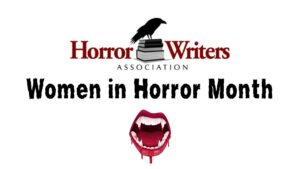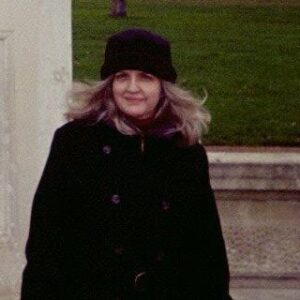Women in Horror Month 2024: An Interview with S.P. Miskowski

What inspired you to start writing?
In my case, it wasn’t a choice. Like a lot of writers, I started early. Before my older sister started teaching me to read, at about age three-and-a-half, I was already creating stories in my head and sharing them with my family. My mom bought writing tablets at the grocery store, probably thinking they would help me learn the alphabet. And they did, but first I filled a stack of them with loops and scribbles. Imagine how surprised I was to find adults couldn’t read the stories I was writing! So, in a sense, I learned to write in order to communicate those stories.
What was it about the horror genre that drew you to it?
When I was a child there wasn’t such a big distinction between mainstream and horror. There were literary and popular (bestsellers), and sometimes literary works were also popular. At the library, American fiction included Herman Melville, Mark Twain, and Edgar Allan Poe. I was reading Poe’s stories and trying to imitate them by the age of eight. At eleven or so, I just picked up any book with a cool cover. I read The Godfather and Rosemary’s Baby because I could buy them off the racks at the local pharmacy. I know horror writers who are very concerned about categories and what they mean, and that’s interesting in an academic sense, but I’m really only interested in the story at hand. What will make it more effective, and closer to what I’ve imagined?
Do you make a conscious effort to include female characters and themes in your writing and if so, what do you want to portray?
I do not make a conscious effort to include female characters. My life story includes powerful and fascinating women. Six aunts, three sisters, and my mom dragged us up from poverty through sheer will and resourcefulness. She did this by running a daycare from our home. There I met dozens of women in all sorts of circumstances, all of them requiring my mom’s reliable and affordable services. For years and years, I took care of children and listened to women talk about their concerns. Women are the background of my life, and they are central to most of my stories. I don’t have to think about including them. They show up fully formed, vivid, talking or screaming, planning or breaking things. They come to me, and I tell their stories.
What has writing horror taught you about the world and yourself?
Horror will always be close to my heart. It’s a comfort during difficult times, and a barometer of tolerance. A test, like my initials. I don’t use “S. P.” in order to make someone think I’m a male writer. At first, it was for convenience, adopting the nickname my classmates employed in graduate school. Then I had stories published under this name, and it seemed silly to go back. But as the years go by, I find it saves me a lot of time and effort to observe who accepts my name and who just can’t handle it. The people who can’t handle it are not going to be able to deal with anything else about me, so I leave them to their overly judgemental ways and keep walking. Horror is like that. Some people will say no, no, no, making assumptions and rejecting it outright. They don’t realize, along with Stephen King they’re rejecting Edgar Allan Poe, John Ajvide Lindqvist, Mary Shelley, Shirley Jackson, Ira Levin… They’re missing out on a vast section of literature. It isn’t all rabid Saint Bernards. And Stephen King isn’t all rabid Saint Bernards. Some of his short stories are among the best I’ve ever read, in purely literary terms.
How have you seen the horror genre change over the years? And how do you think it will continue to evolve?
As more readers discover stories with horror elements that speak to them and spark their imagination, the field grows. New writers emerge. I think the big change is diversity, and that means interesting work by many more people with many different perspectives. This is one way to keep horror—or any genre—fresh and engaging, by not getting stuck in one view of one theme stated in the same way again and again. Diversity is part of our survival, and I find the new wave of horror writing very encouraging.
How do you feel women have been represented thus far in the genre and what hopes do you have for representation in the genre going forward?
It’s hard to pull a rabbit out of a non-existent hat. I don’t blame male writers for copying shallowly conceived female characters from horror novels they read when they were kids. But there comes a time when you want more. You want to see the world in a more sophisticated and truthful way. To accomplish this, you must accept women as people rather than a collection of stereotypical traits. The jury is still out on whether or not we will accept women as complex individuals in our society. I think the answer is inevitable, but it’s a long time coming.
Who are some of your favorite female characters in horror?
Eleanor Vance (The Haunting of Hill House) is an extraordinary protagonist, a study of how unlikable and unreliable a character readers will tolerate. When she isn’t mousy and dull, she’s deceitful and strange. She appropriates the details of other people’s lives. She has a weird history, more than a brush with the supernatural, and seems to have spent most of her life under the thumb of her domineering mother. All of this adds up to an unattractive character, susceptible to coercion, primed to obey the influence of stronger personalities, whether they’re alive or dead. Shirley Jackson was an innovative writer who took big risks with form and characterization. Eleanor is a prime example of the kind of unlovable female character I find fascinating. Like Barbara in Notes on a Scandal by Zoe Heller and the teacher in Confessions by Kanae Minato, she is what she is and if you accept that—instead of griping about her lack of maternal instinct or her unattractiveness or what you perceive as a lack of feminine virtue—you will find her story riveting.
Who are some women who write horror you recommend our audience check out?
Lynda E. Rucker, Nadia Bulkin, Paula D. Ashe, Angela Slatter, Polly Schattel, Yoko Ogawa, Gemma Files, Silvia Moreno-Garcia…
What is one piece of advice you would give horror authors today?
Stay in touch with the joy of creating a story. There are a million distractions online, plenty of other writers expressing their discouragement or celebrating their success on any given day. Interact for social balance but don’t get distracted from the work you’re doing. Remember that you will be rejected sometimes. You’ll have bad days. Stay the course, if you love to write. Feed your imagination and keep going. The little failures make the successes that much more exciting.
And to the women who write horror out there who are just getting started, what advice would you give them?
If you have a story to tell and you feel you must tell it, don’t let anything stop you. Measure the degree to which circumstances and relationships encourage or discourage what you need to do and keep them in perspective. Don’t be afraid to shape your life around writing, in terms of work and family. People will expect you to be nurturing, and you can be, but you can also say when it’s time for others to make room for what you love to do. It does not mean you’re weird or unkind or evil or wrong. It means you are a writer, and you’re going to write.
 S.P. Miskowski is the recipient of two National Endowment for the Arts Fellowships, for literature and drama. Her books have been recognized with four Shirley Jackson Award nominations and two Bram Stoker Award nominations. Her stories have appeared in many anthologies including Haunted Nights, Human Monsters, Looming Low I and II, The Madness of Dr. Caligari, Uncertainties 3, October Dreams 2, The Best Horror of the Year Vol. 10, and Darker Companions: 50 Years of Ramsey Campbell, and in magazines including Identity Theory, Black Static, Vastarien, Supernatural Tales, and Cosmic Horror Monthly. Her grunge noir novel I Wish I Was Like You was named This Is Horror “Novel of the Year 2017” and received the Charles Dexter Award from readers of Strange Aeons.
S.P. Miskowski is the recipient of two National Endowment for the Arts Fellowships, for literature and drama. Her books have been recognized with four Shirley Jackson Award nominations and two Bram Stoker Award nominations. Her stories have appeared in many anthologies including Haunted Nights, Human Monsters, Looming Low I and II, The Madness of Dr. Caligari, Uncertainties 3, October Dreams 2, The Best Horror of the Year Vol. 10, and Darker Companions: 50 Years of Ramsey Campbell, and in magazines including Identity Theory, Black Static, Vastarien, Supernatural Tales, and Cosmic Horror Monthly. Her grunge noir novel I Wish I Was Like You was named This Is Horror “Novel of the Year 2017” and received the Charles Dexter Award from readers of Strange Aeons.
S.P. is represented by the Levine Greenberg Rostan Literary Agency. Film/TV rights: Anonymous Content. You can find her at the following: Author site, JournalStone.



